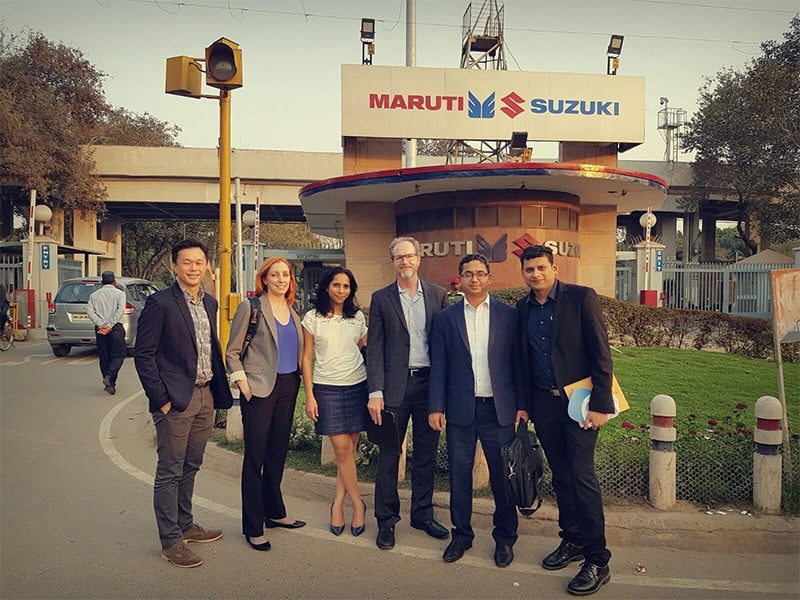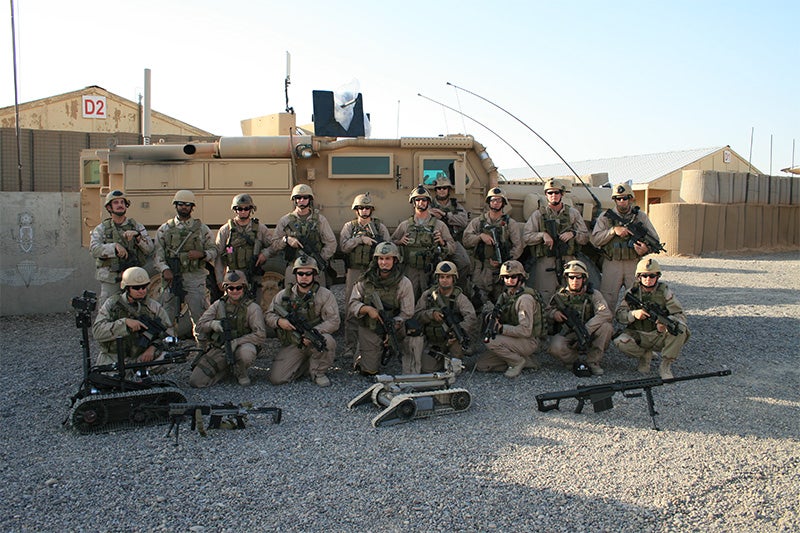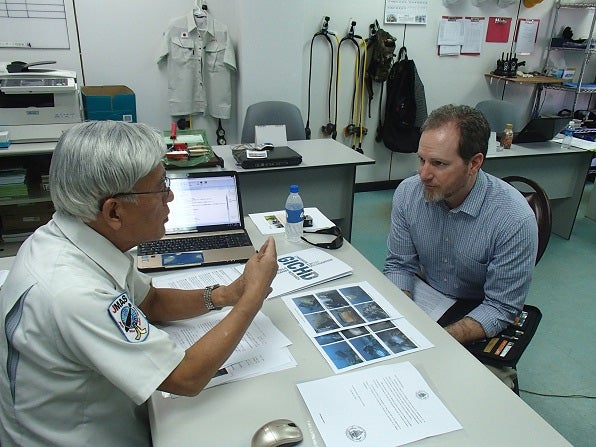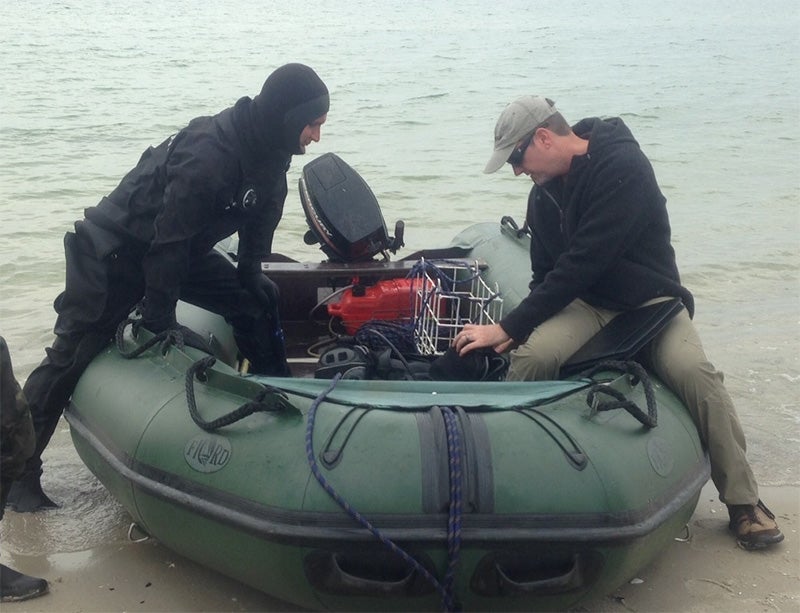A U.S. Navy Lt. Commander Seeks Purpose-Driven Work with the UN
A U.S. Navy Lt. Commander Seeks Purpose-Driven Work with the UN
Justin Smith’s (’17) UCLA-NUS executive MBA catapulted him to a new career
December 8, 2022

- U.S. Navy Lieutenant Commander Justin Smith chose UCLA Anderson’s joint degree with the National University of Singapore to prepare for an international purpose-driven career
- The UCLA-NUS executive MBA taught him to take a collaborative approach to communication and leadership and an awareness of multiple global perspectives
- Since earning his degree, Smith has served in progressively senior positions with the United Nations’ support and assistance missions in Libya and Somalia
After 23 years in the United States Navy Special Operations’ Explosive Ordnance Disposal (EOD), Justin Smith (’17) knew he needed to continue his career in a “purpose-driven” organization. But which one? And how could his resume stand out among hundreds so that he could land the “perfect” job for his goals, talents and skills?
These were the questions Smith contemplated as he officially retired from the U.S. Navy as a lieutenant commander, highly decorated for his exceptional leadership, service and achievement. Smith has always been a lifelong learner, earning his bachelor’s degree and later a master’s while serving in the Navy. So, the idea of earning an MBA to help him transition out of the military and into the civilian sector was not a hard reach. He had excelled in his undergraduate business degree. His training and successes on the job in the U.S. Navy had fine-tuned his leadership skills. What he needed was a broad graduate business education that would help take his strategic thinking to the next level and continue developing the “global” perspective he acquired during his time in the Navy.
Born and raised in Southern California, Smith was aware of UCLA’s stature from a young age. UCLA Anderson had a mystique and brand that met his top criteria for his next degree: He wanted to attend an institution that was innovative, that embraced a world-oriented perspective and that was recognized globally. UCLA’s 15-month joint executive MBA with the National University of Singapore was his answer.

“The program gave me the core knowledge I needed to manage and lead any organization,” Smith says. “And it was flexible enough to fit into my crazy life. By the time I completed the program, I already had a taste of working in the international nonprofit sector, and I was also beginning my work in the Mine Action Service at the United Nations. The UCLA-NUS EMBA program allowed me to work overseas while studying remotely, with the just the right number of in-person sessions,” Smith added.
Smith says that his most important learnings from his MBA program were in the areas of communication and leadership style. Transitioning from 23 years of military service is often difficult. Smith approached the transition as any lifelong learner would: He analyzed what he needed to change and what he should keep from his military background in order to function effectively as a leader in the civilian world. “The program provided me an environment to engage with professionals outside the military and to adapt some of my communication and leadership approaches. As you would expect, military leaders are very direct and honest,” Smith says. “An early lesson I learned in the EMBA program was to take a softer and more collaborative approach to communication and leadership.”

Smith also valued the sense of community and the network of colleagues he built through the UCLA-NUS program. “The practical lessons I learned from my peers in the program were invaluable,” he says. “The participants came from a wide range of countries and professional backgrounds, which led to a wide range of perspectives and interpretations of any business issue we studied. It really opened my eyes and my thinking: To appreciate their points of view, I had to take a step back, look at the issue differently and challenge my own understanding of a problem.”
Smith credits his personal network of contacts, built throughout his career and education, with helping him navigate his transition from military to civilian life relatively smoothly. It was through this network that Smith found his job within the international nonprofit sector, as well as his first job at the UN.
Today, five years after finishing his UCLA-NUS EMBA, Smith is chief of the Mine Action Service (UNMAS) for the United Nations Support Mission in Libya. In January 2023, he will again be promoted to a senior management role leading a much larger team as the chief of branch for the UNMAS in Somalia.
“The values that underpin the Anderson character resonate with me deeply,” Smith says. “Share success. Think fearlessly. Drive change. On reflection, these same values have guided my career. They fueled my success in the military and are now helping me succeed in the civilian sphere. Although the contexts are different, Anderson’s values are equally important for graduates as they become leaders in a world that is increasingly dynamic and challenging.
“I have always been that person who challenged the status-quo,” Smith continued, “whether in the military, where it involved adopting new technology to reduce risk to our operators, or in the UN, where I challenged the UN’s hesitant approach to collaboration, and instead actively built relationships with local stakeholders and partners,” Smith says.

“I have lived most of the last seven years in Somalia and Libya. It takes a deep commitment to ‘thinking fearlessly’ to navigate the dynamic political and security landscape and successfully manage programs in this context. My teams established professional relationships with national authorities, local organizations and international partners — quite uncommon in the UN culture — to develop an in-depth understanding of complex challenges. But I knew we had to collaborate and to coordinate together in order to move past challenges,” Smith explains.
Today, his core management responsibilities are similar to those in most commercial organizations: financial management, people management, risk management, change management and so on. The main difference, he says, is the context. Instead of managing a company for profit, he supports governments to help them address challenges and build national institutions. He works with diverse organizations that represent humanitarian, development, economic, political, and peace and security interests.
“When working on any change initiative, I have always believed in ‘quiet advocacy’ through one-on-one relationships that are built on respect for each other’s perspectives. The UCLA-NUS EMBA program helped me develop this skill. It has become critical to my work now, where being sensitive to diverse perspectives is vital to achieving mutual goals.”
At first glance, Smith’s career trajectory looks like the successful execution of a well-thought-out plan that spanned decades. What can prospective and current Anderson students do to chart a similar path for themselves?
“In reality,” Smith says, “my career path is actually quite opportune. I credit its positive twists and turns to two main factors. First, I am a lifelong learner. After a rocky start in high school, I quickly realized the value of education, earning a bachelor’s while off duty in the military and later a master’s at a military war college. Throughout my military career, job training was intense and continuous because of the life-or-death nature of our work. My decision to pursue an MBA from Anderson included learning from my peers in profound ways that would be instrumental in my civilian career.

“Second, I cannot overstate the importance of networking. My first job after retirement was in Geneva, Switzerland, for an international organization. I only knew about the job because of networking, and I was only considered for the job because of networking. The same goes for my follow-on posts in the UN.
“UCLA Anderson provides a large and supportive network of alumni to ease transition from any industry into your profession of choice. When you are looking for advice, insight or advocacy, it isn’t difficult to find an Anderson alumnus who will step up to offer support.”